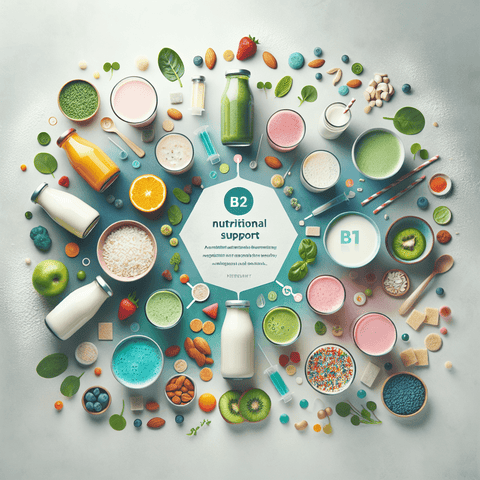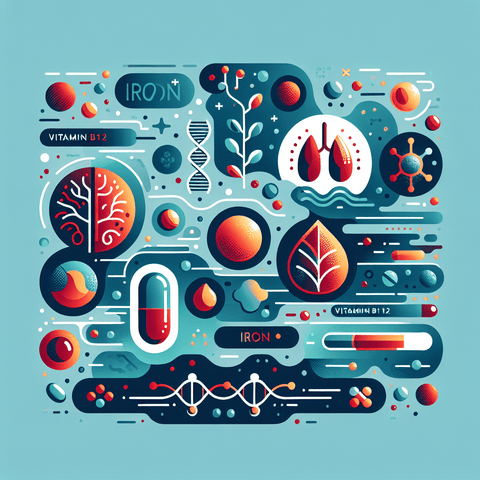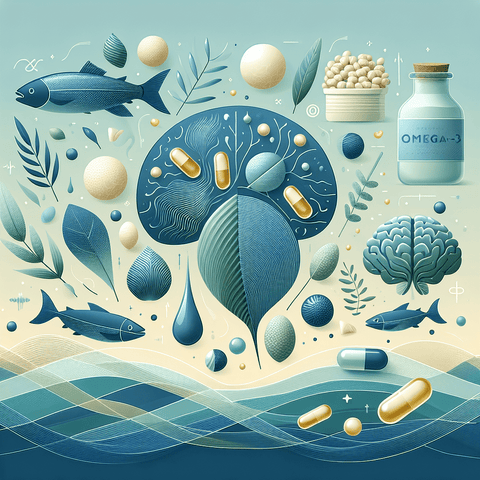Introduction
Vitamin B12, scientifically known as cobalamin, is one of the essential water-soluble B vitamins that plays a pivotal role in maintaining a healthy nervous system, producing red blood cells, and aiding in DNA synthesis. As a vital micronutrient, it is involved in energy metabolism and helps prevent megaloblastic anemia, a condition that makes people feel tired and weak. Despite its significance, Vitamin B12 is not synthesized by the human body and must be obtained through diet or supplementation.
Today’s fast-paced lifestyle coupled with growing dietary preferences—such as veganism and vegetarianism—can make obtaining adequate B12 particularly challenging. Individuals with gastrointestinal issues or absorption disorders are also among the groups prone to B12 deficiency. Fortunately, the food and beverage industry has formulated creative, convenient solutions: drinks that are fortified with or naturally high in vitamin B12.
This article delves deep into the different types of beverages—fortified drinks, B12 shots, animal-based options, B12-rich smoothie recipes, and traditional broths—that can help you meet your daily B12 requirements. Whether you're someone exploring vitamin supplementation or simply looking to boost your nutritional intake, discovering the best drinks high in B12 is a practical and enjoyable approach. We'll also explore how these drinks align with various diets and how to choose the right ones for your specific needs.
Read on to discover which drink is rich in Vitamin B12 and how to incorporate these beverages into your daily routine for improved energy, focus, and overall vitality.
Vitamin B12 Rich Drinks: An Essential Nutritional Supplement for Your Daily Intake
Vitamin B12-rich drinks serve as an accessible way to supplement a nutrient that is largely absent in plant-based diets and frequently under-absorbed by individuals with certain digestive health conditions. These drinks come in a variety of forms—fortified plant milks, dairy beverages, smoothies, shots, and even traditional broths. What makes these drinks especially appealing is their convenience and the ease with which they fit into daily routines.
For vegetarians and vegans, B12 may be one of the most challenging nutrients to acquire, as it is predominantly found in animal-based products. B12-rich drinks, especially fortified beverages and supplements, play an essential role in closing the nutritional gap. In individuals with autoimmune conditions like pernicious anemia or those with gastrointestinal maladies—such as Crohn’s disease or celiac—B12 absorption can be hindered, necessitating more bioavailable forms like B12 drinks and shots.
The drinks discussed in this post are segmented into a few categories:
- Fortified beverages: plant-based milks, juices, cereals enriched with vitamin B12.
- B12 vitamin shots: used in medical or high-efficiency wellness situations.
- Animal-based beverages: dairy, seafood broths, and egg-infused drinks with natural B12.
- B12 smoothies: nutrient-dense blends with fortified or natural B12 ingredients.
- Traditional beverages and natural broths: such as clam juice or fermented milk products.
By incorporating even one of these drinks into your daily intake, you can support your body’s demand for B12, promote natural energy levels, and optimize cognitive and emotional wellness. Where oral supplements may be inconvenient for some, drinks provide an easier, often tastier approach to health maintenance.
Fortified Beverages: Boosting Your B12 Intake with Expert-Added Nutrition
Fortified beverages are products that have nutrients added to them during manufacturing. These additions are not originally present in the beverage but are included to enhance nutritional value. Fortification of Vitamin B12 is particularly prevalent in products targeted toward individuals on vegetarian or vegan diets due to the nutrient’s natural absence in plants.
Plant-based milks—such as almond, soy, oat, and rice milk—are among the most common carriers of fortified B12. When selecting such drinks, it's important to check the packaging to ensure the presence of cyanocobalamin or methylcobalamin, which are chemical forms of Vitamin B12. In many Western supermarkets, popular brands of soy or almond milk deliver between 1.0 to 3.0 mcg of B12 per cup—approximately meeting the Recommended Daily Intake (RDI) for adults.
Additionally, some fruit or vegetable juices, breakfast cereals, and energy drinks are enriched with B12. These usually cater to consumers looking for functional and convenient ways to enhance their diet. However, buyers should stay vigilant: not all fortified products are created equal. Many contain added sugars, preservatives, and other additives that can negate some of the health benefits.
Fortified drinks are especially beneficial for:
- Vegans and vegetarians seeking reliable non-animal B12 sources
- Individuals over 50, whose natural absorption of B12 often declines with age
- People with malabsorption syndromes or conditions affecting the small intestine
A good starting point is to include one cup of fortified plant milk daily. For those using fortified juices or energy drinks, moderation is key due to calorie and sugar content. Incorporating these drinks in breakfast smoothies or cereal bowls is a practical, flavorful way to elevate your B12 intake.
Want to explore more vitamin options for daily health support? Check out our curated selection of Vitamin C supplements for immunity and energy or our magnesium supplements for muscle and bone health.
B12 Vitamin Shots: Fast and Efficient B12 Delivery in a Small Dose
Vitamin B12 shots are a concentrated form of supplementation often administered intramuscularly or subcutaneously to provide rapid and efficient absorption. Unlike B12 obtained through digestion, these shots bypass the gastrointestinal system, making them particularly effective for individuals with absorptive deficiencies or those requiring immediate B12 replenishment.
The formulation used in these injections, typically methylcobalamin or cyanocobalamin, offers nearly 100% bioavailability directly into the bloodstream. Due to this direct method of delivery, it’s common to find B12 shots recommended by healthcare professionals for individuals suffering from B12-deficiency anemia, neurological symptoms, or fatigue disorders.
These shots are beneficial for:
- People with pernicious anemia or GI absorption issues
- Older adults with diminished intrinsic factor levels
- Individuals on medications like metformin or proton-pump inhibitors
- Strict vegans or vegetarians deficient in dietary B12
Comparing B12 shots to drinkable supplementation, the distinction lies in absorption and immediacy. Oral intake requires conversion within the liver and may depend on multiple biological factors. Injections, meanwhile, deliver immediate results and can lead to a quicker rise in serum B12 levels. However, shots require physician consultation, a sterile setting, and are usually part of a supervised treatment regimen.
While effective, B12 shots should be used under professional medical guidance and are not typically needed for general wellness unless a confirmed deficiency or absorption issue exists.
Animal-Based Drinks: Natural Sources of B12 from Authentic Animal Products
Vitamin B12 is uniquely synthesized by bacteria, and as such, it's naturally present in animal products that have absorbed these bacteria during digestion or fermentation processes. Animal-based drinks, such as milk, yogurt drinks, and broths made from seafood or meat, provide a natural, unfortified source of B12.
Dairy products are perhaps the most widely available natural drink source of B12. A cup of whole milk contains approximately 1.2 mcg of Vitamin B12, making it a practical choice for individuals who consume dairy. Similarly, fermented dairy drinks such as kefir and lassi retain sufficient B12 while offering added gut benefits.
Other traditional animal-based liquid sources include bone broths, particularly those made from beef bones or organ meats. Fish-based broths made with sardines or salmon heads can also be surprisingly B12-rich. Clam juice stands out due to clams being one of the highest B12-containing foods—just a small glass can yield more than 100% of the daily intake.
Integrating these into your diet doesn't have to be difficult. You can enjoy a warm cup of broth during lunch or use clam juice as a flavorful addition to sauces and marinades. Dairy drinks can accompany meals or form the base of smoothies.
For individuals following vegetarian or vegan diets, these animal-based options may not be suitable. In such cases, fortified plant-based drinks or supplements are recommended. If you’re looking for complementary nutrients while considering an animal-based or pescatarian diet, also explore our offerings in DHA/EPA omega-3 supplements for cardiovascular and brain health support.
B12 Smoothie Recipes: Delicious and Nutritious Ways to Boost Your B12 Levels
Smoothies are a flavorful and adaptable way to incorporate B12-rich foods and supplements into your diet. Whether you prefer fruit-based, green, or protein-packed smoothies, integrating ingredients that contain or are fortified with B12 can easily transform your beverage into a powerful nutritional tool.
Common B12-rich smoothie ingredients include:
- Greek yogurt or dairy milk
- Fortified almond, soy, or oat milk
- Soft cheeses like cottage cheese or ricotta (blended into savory smoothies)
- Fortified nutritional yeast (adds a cheesy, savory flavor)
Sample Smoothie: Berry B12 Energy Smoothie
Ingredients:
- 1 cup fortified soy milk (2.4 mcg of B12)
- 1/2 cup Greek yogurt (0.6 mcg B12)
- 1/2 cup frozen mixed berries
- 1 banana
- 1 tablespoon ground flaxseeds
- Add all ingredients into a blender.
- Blend for 45–60 seconds until smooth.
- Serve immediately for a fresh, nutrient-packed start to your day.
For vegan alternatives, swap Greek yogurt with fortified coconut yogurt, and consider adding a tablespoon of fortified nutritional yeast or spirulina. Note, however, that while spirulina contains pseudo-B12 analogs, it is not a reliable source of bioavailable B12 and is best used as a supplement rather than a primary source.
Natural B12 Sources: Whole Foods and Traditional Beverages for Sustainable Nutrition
Beyond modern fortified drinks and smoothies lies a world of traditional nutrition built on naturally occurring sources of B12. Whole food beverages and broths, such as clam juice, beef bone broth, and fermented dairy drinks, provide not just B12, but a wide array of other essential nutrients.
Clam juice, for instance, delivers over 80 mcg of B12 per 100 grams—a staggering 30 times the average adult RDI. Traditional kefirs and lassis, fermented with B12-synthesizing cultures, offer a dual benefit of gut and micronutrient support. Beef or chicken broth slow-cooked with bones adds trace minerals alongside naturally occurring cobalamin.
However, relying solely on natural sources can be limiting due to bioavailability, cooking methods, and portion size. It also may not be feasible for vegetarians, vegans, or those with dietary allergies. In such cases, centering meals around fortified options or consulting healthcare professionals for oral or injectable B12 options may be necessary.
For additional vitamin benefits that complement B12-rich drinks, consider browsing our resources on vitamin D supplements or vitamin K for bone health, which often interact synergistically with other nutrients in the body.
Conclusion
Incorporating drinks rich in Vitamin B12 into your daily routine provides a simple and effective means of maintaining this essential nutritional balance. From modern solutions like fortified plant milks and B12 shots to traditional broths and smoothies, the abundance of options ensures there is something for everyone—regardless of dietary preferences or restrictions.
When selecting your drink of choice, consider your individual needs. Vegans and vegetarians may lean toward fortified soy or oat milks, while omnivores might find natural B12 from dairy or seafood-based drinks more suitable. People with malabsorption issues should consult healthcare providers regarding options like B12 shots.
By blending these options into a diverse, balanced diet, you support your nervous system, energy metabolism, and red blood cell production. Nourishing your body doesn’t have to be complicated. A thoughtful sip can bring you one step closer to wellness.
Q&A Section
Q: What are the best plant-based drinks high in B12?
A: Fortified soy, almond, oat, and rice milks are excellent plant-based beverages fortified with B12. Always check the label for “cyanocobalamin” or “methylcobalamin.”
Q: Are B12 shots more effective than oral supplements or drinks?
A: B12 shots deliver the vitamin directly into the bloodstream, bypassing the digestive system. They are ideal for those with absorption issues or severe B12 deficiencies, although they must be administered under medical supervision.
Q: Can smoothies be a good source of B12?
A: Yes. Smoothies made with fortified plant milks, dairy yogurt, or nutritional yeast can effectively contribute to daily B12 intake while providing a customizable and tasty nutritional option.
Q: What traditional drinks are naturally high in B12?
A: Clam juice, beef or chicken broth, and fermented dairy drinks like kefir are natural sources of B12. These are excellent choices for those consuming animal products.
Q: How much B12 do I need daily?
A: The recommended daily intake for adults is approximately 2.4 micrograms. Pregnant or breastfeeding women may require more and should consult a healthcare provider.
Important Keywords
- vitamin B12 drinks
- fortified plant milk B12
- natural sources of vitamin B12
- B12 smoothies recipes
- animal-based B12 drinks
- B12 energy drinks
- vitamin B12 shots
- how to increase B12 levels naturally
- best drinks with B12 for vegans
- topvitamine supplements



